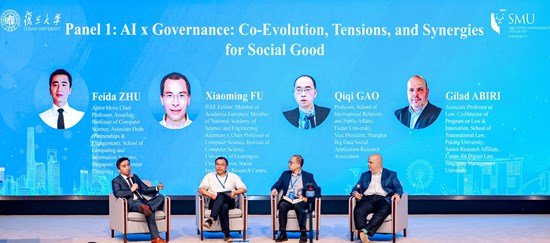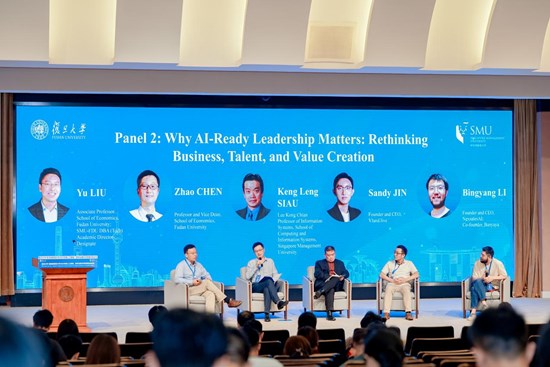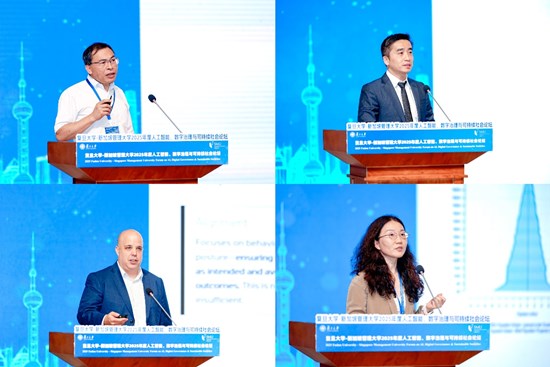Fostering Dialogue and Strategic Partnership: 2025 Fudan University (FDU) and Singapore Management University (SMU) Forum on AI, Digital Governance and Sustainable Societies Successfully Concluded
Singapore, Singapore–(Newsfile Corp. – October 6, 2025) – On 29 September, the “2025 Fudan University (FDU) and Singapore Management University (SMU) Forum on AI, Digital Governance and Sustainable Societies”, jointly hosted by Fudan University (FDU) and Singapore Management University (SMU), successfully concluded. The Forum brought together experts, scholars, and industry leaders from China, Singapore, Germany and beyond to engage in in-depth discussions on the themes of artificial intelligence, digital governance, and sustainable societies.
The Forum delved into the opportunities and challenges presented by the rise of AI. It sought to promote robust governance frameworks that ensure safety, fairness, and transparency while stressing the critical need to leverage collective knowledge, foster cross-disciplinary collaboration, and facilitate data sharing. The ultimate goal is to develop and apply AI technologies in ways that ensure responsibility, inclusion and long-term societal impact, thereby helping to build more resilient and sustainable societies. A key takeaway was the unanimous consensus among participants that AI has evolved beyond a mere technological frontier to become a powerful societal force that is fundamentally reshaping how we live, work, and govern, prompting a collective call for nations to bolster cooperation and work together to build a global AI governance system that is trustworthy, collaborative, and mutually beneficial.
Keynote Addresses: Multi-Dimensional Perspectives on the Challenges and Opportunities in the Digital Era
Keynote speakers Prof FU Xiaoming (top left), Assoc Prof ZHU Feida (top right), Assoc Prof Gilad ABIRI (bottom left) and Prof LI Qiang (bottom right) shared their insights on the core issues of AI, digital governance, and sustainable societies from different perspectives.
Professor FU Xiaoming, an IEEE Fellow and a member of both the Academia Europaea and the National Academy of Science and Engineering (Germany), Chair Professor at the Institute of Computer Science, University of Göttingen, Germany, as well as Chief Scientist of the Social Intelligence Research Centre at Fudan, delivered a keynote address titled “Social Mobility in Ancient Empires and the Digital Age – Reimagining History and Contemporary Society through AI for the Social Sciences and Humanities”. His methodology combines traditional prosopographical research with cutting-edge machine learning algorithms and extracts social mobility patterns from vast historical records. This approach makes large-scale, cross-civilisational comparative studies possible. The research not only illuminates the mechanisms by which institutional designs in ancient empires influenced social mobility but also provides critical historical insights for crafting governance policies in contemporary digital societies.
Associate Professor ZHU Feida, who serves as the Associate Dean of Partnerships & Engagement at the School of Computing and Information Systems and Aptos Move Chair Professor at SMU, delivered a keynote on “Collaborative Intelligence & Tokenised Economy for a Sustainable Digital Future”. Assoc Prof Zhu delved into the key governance challenges of AI development, tackling the crucial question of how to build trustworthy and incentivized collaborative mechanisms in a landscape where data, models, and computational resources are distributed in a decentralized setting. From the unique perspective of collaborative intelligence and the tokenized economy, he systematically explored the immense potential of integrating AI with Web3 technologies. He proposed that by building transparent data governance, equitable value distribution, and energy-efficient decentralized infrastructures, we can cultivate sustainable digital ecosystems that are economically inclusive, environmentally responsible, and societally beneficial. He specifically addressed the critical importance of quantifying data contributions and establishing fair profit-sharing mechanisms. To build a sustainable digital collaborative ecosystem, he put forth a “trust-incentive” dual-pillar solution framework. Through a series of case studies, Assoc Prof Zhu demonstrated how this technological convergence can help enterprises and society achieve a paradigm shift from isolated innovation to shared, sustainable digital growth.
Associate Professor Gilad ABIRI of Peking University’s School of Transnational Law delivered a keynote titled, “Regulating for AI Legitimacy”, in which he explored the core challenges facing current AI governance. Assoc Prof Abiri argued that while AI governance tends to fixate on the alignment problem, it overlooks a more fundamental issue: legitimacy-how to secure public trust in AI authority. He identified two major barriers to this legitimacy: the “black box” of decision-making, which makes algorithmic choices feel arbitrary, and a “collective absence,” where AI lacks visible community ownership. He proposed a two-pronged solution to these issues: making AI governance legible through transparent procedures and establishing participatory design mechanisms that give communities genuine voice. Assoc Prof Abiri underscored that establishing AI legitimacy is not merely about earning public trust; it is the cornerstone for international cooperation in the algorithmic age.
Professor LI Qiang from the Fudan Institute on Ageing and Secretary-General of the Shanghai Population Association presented an analysis of “China’s Population Ageing and Digital-Intelligent Elderly Care”. She pointed out that China is undergoing the most rapid population ageing process in human history, transitioning from an ageing to a super-aged society in just 32 years. Currently, China is home to over 220 million people aged 65 and above, a number projected to surge to 350 million by 2050. Faced with this unprecedented challenge, China is actively pioneering innovations in smart elderly care, leveraging technologies such as LLM-based voice assistants, intelligent monitoring devices, and telemedicine platforms to construct a comprehensive digital service ecosystem. She emphasised that despite challenges like the digital divide and uneven regional development, the synergy between government policy support and enterprise-led technological innovation is providing a compelling and applicable “China Model” for ageing societies worldwide.
Panel Discussions: In-Depth Interdisciplinary Dialogue
The Forum featured two panel discussions that delved into the governance and development of the AI era from diverse perspectives.
The first panel discussion, moderated by Associate Professor ZHU Feida, focused on the theme of “AI × Governance: Co-Evolution, Tensions, and Synergies for Social Good.” Panelists included Professor FU Xiaoming, Professor GAO Qiqi, School of International Relations and Public Affairs, Fudan University, and Associate Professor Gilad ABIRI.
The panelists noted that AI development and governance mechanisms mutually shape one another. They cited historical examples, such as seemingly “deregulatory” provisions like Section 230 of the Communications Decency Act, which, while fostering the rapid growth of internet platforms, also led to governance challenges related to disinformation and an absence of accountability. Focusing on data and privacy protection, the panelists reached a consensus that AI governance should create a multi-layered interplay between law, ethics, and technology. They advocated for leveraging technical solutions like differential privacy and distributed computing to reconcile data security with social value. The discussion concluded by highlighting that the core of AI governance is not a dichotomy of “to regulate or not to regulate”. Instead, its true essence lies in implementing the principle of “tech for good” into tangible systems and practices through cross-disciplinary and transnational collaboration.

Moderated by Assoc Prof ZHU Feida (far left), the “AI × Governance” panel featured a group of distinguished scholars (pictured left to right): Prof FU Xiaoming, Prof GAO Qiqi, and Assoc Prof Gilad ABIRI, who shared their insights on the multiple pathways for AI governance.
The second panel discussion, moderated by Associate Professor LIU Yu from School of Economics, Fudan University, focused on the theme of “Why AI-Ready Leadership Matters: Rethinking Business, Talent, and Value Creation”. Distinguished panelists, including Professor CHEN Zhao (Vice Dean of the School of Economics, Fudan University), Professor SIAU Keng Leng of SMU’s School of Computing and Information Systems, and tech founders Mr. JIN Sandy (founder and CEO of Vland.live) and Mr. LI Bingyang (founder and CEO of NexsalesAI), offered a multi-faceted exploration of key issues.
The discussion began by exploring how AI is reshaping leadership and business models. A consensus emerged among the panelists that artificial intelligence is not only changing the operational logic of businesses but is also redefining the very definition of leadership. It was noted that leaders in the AI era must possess both generalist and specialist qualities, enabling them to transfer and integrate knowledge across different domains and to demonstrate systems thinking and human-machine collaboration skills.
Industry leaders highlighted that AI is propelling business from linear growth toward a systemic, intelligence-driven transition. The panelists agreed that future business leaders must possess strategic agility and technical acumen to guide their organisations in seizing the opportunities of the intelligent economy. Furthermore, amidst the convergence of technologies such as AI, blockchain, and data security, they must seek a dynamic balance between innovation and ethics, and between growth and responsibility.

Moderated by Assoc Prof LIU Yu (far left) and panelists Prof CHEN Zhao, Prof SIAU Keng Leng, Mr. JIN Sandy, and Mr. LI Bingyang (from left to right) delved into a profound discussion on leadership and business innovation in the AI era during the panel session titled “Why AI-Ready Leadership Matters.”
Looking Forward: Building an Inclusive Digital Civilisation
The successful conclusion of the Forum marks a significant milestone in the collaboration between SMU and Fudan in the domains of AI, digital governance, and sustainable societies. This opportunity for cross-border exchange brought together experts and scholars from China, Singapore, and Germany, who reached a shared consensus: with the rapid development of AI technology, human society must collectively embrace a global perspective, an inclusive spirit, and collaborative frameworks to shape the future of digital civilisation.
The Forum served as a vital platform for regional academic dialogue, contributing Asian perspectives to global discourse on AI governance, digital ethics, and sustainable development. Looking ahead, both universities will foster interdisciplinary, cross-sectoral research with a focus on real-world application, transforming their bilateral partnership into a dynamic multilateral collaboration and leveraging on the collective strengths of all stakeholders. By amplifying Asian research on the global stage, the two institutions will generate broader impact through knowledge and influence, contributing both thought leadership and practical solutions to the building of a safe, equitable, and sustainable intelligent era.
At the Forum, Fudan University President JIN Li and Singapore Management University President Lily KONG signed a Memorandum of Agreement, witnessed by Fudan University Vice President CHEN Zhimin. This milestone not only marked the successful conclusion of the Forum but also signified the beginning of a new chapter of collaboration in research and education between the two universities. Moving forward, SMU and Fudan will work together across key areas including AI governance, computational social science, urban sustainability, and ageing societies, jointly exploring innovative pathways to advance societal impact and sustainable development.
Contact:
Singapore Management University (SMU)
sai.yang@jeffery.asia
+86 13810515693
https://www.smu.edu.sg
To view the source version of this press release, please visit https://www.newsfilecorp.com/release/269281

